 Petzlover
Petzlover Black and Tan Coonhound is originated from United States but Dandie Dinmont Terrier is originated from United Kingdom. Black and Tan Coonhound may grow 41 cm / 17 inches higher than Dandie Dinmont Terrier. Black and Tan Coonhound may weigh 23 kg / 51 pounds more than Dandie Dinmont Terrier. Black and Tan Coonhound may live 3 years less than Dandie Dinmont Terrier. Black and Tan Coonhound may have more litter size than Dandie Dinmont Terrier. Both Black and Tan Coonhound and Dandie Dinmont Terrier requires Moderate Maintenance.
Black and Tan Coonhound is originated from United States but Dandie Dinmont Terrier is originated from United Kingdom. Black and Tan Coonhound may grow 41 cm / 17 inches higher than Dandie Dinmont Terrier. Black and Tan Coonhound may weigh 23 kg / 51 pounds more than Dandie Dinmont Terrier. Black and Tan Coonhound may live 3 years less than Dandie Dinmont Terrier. Black and Tan Coonhound may have more litter size than Dandie Dinmont Terrier. Both Black and Tan Coonhound and Dandie Dinmont Terrier requires Moderate Maintenance.
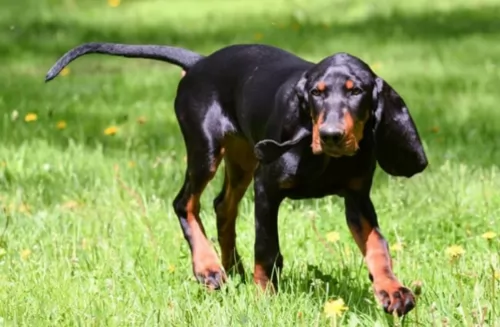 Descendent of the English Talbot Hound, the Black and Tann Coonhound is nevertheless an American creation. Developed by crossing the Black and Tan Virginia Foxhound with the Bloodhound in the very early years of the American experience. It is said that George Washington owned several. The very first Coonhound that was given American Kennel Club registration was the Black and Tan in 1945. They had been admitted to the United Kennel Club in 1912. The Black and Tan Coonhound is a traditional hunting dog – known by hunters as a “trail and tree hound”. This is a dog that finds its prey and trees it. They have incredibly strong instincts to hunt and need to hunt. They can track their prey for miles and if they have a scent you cannot get their attention back. They have been valued because they can “cold track”, following the scent of an animal that left the scene long ago. They are known to have tracked mountain lions and bears as well as deer and coon. They were developed to keep the American settlers safe and well fed, but also to keep them company on the trails or by the fireplace. They are the American Dog.
Descendent of the English Talbot Hound, the Black and Tann Coonhound is nevertheless an American creation. Developed by crossing the Black and Tan Virginia Foxhound with the Bloodhound in the very early years of the American experience. It is said that George Washington owned several. The very first Coonhound that was given American Kennel Club registration was the Black and Tan in 1945. They had been admitted to the United Kennel Club in 1912. The Black and Tan Coonhound is a traditional hunting dog – known by hunters as a “trail and tree hound”. This is a dog that finds its prey and trees it. They have incredibly strong instincts to hunt and need to hunt. They can track their prey for miles and if they have a scent you cannot get their attention back. They have been valued because they can “cold track”, following the scent of an animal that left the scene long ago. They are known to have tracked mountain lions and bears as well as deer and coon. They were developed to keep the American settlers safe and well fed, but also to keep them company on the trails or by the fireplace. They are the American Dog.
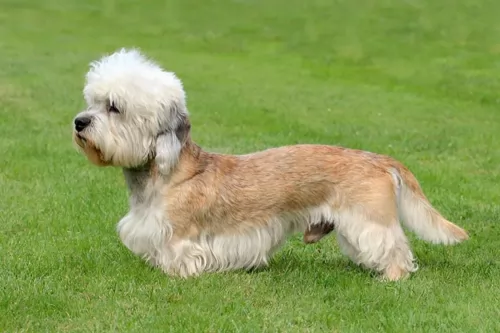 The rough coated Dandie Dinmont Terrier originates from Scotland. They were used centuries ago for hunting otters and badgers.
The rough coated Dandie Dinmont Terrier originates from Scotland. They were used centuries ago for hunting otters and badgers.
There are theories that exist that the dog is a cross between Scottish- and Skye Terriers while others believe there must be some Dachshund in the mix because of the long body of the Dandie Dinmont Terrier.
The Dandie Dinmont Terrier was first recorded as a distinct breed in the late 1600s. The British Dandie Dinmont Terrier Club was formed in 1875 while the American Kennel Club recognized the Dandie in 1886.
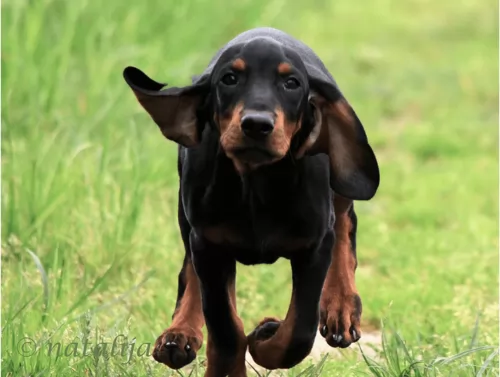 The Black and Tan Coonhound looks like we all imagine a coonhound would look. They have strong and muscular legs, an oval skull and a scissors bite. They have brown or hazel eyes that are very expressive. The ears of course are long like the bloodhound, far back on the head and thin. His nose is amazingly sensitive as he is scent hound. His nostrils are always black. He is a large, strong dog.
The Black and Tan Coonhound looks like we all imagine a coonhound would look. They have strong and muscular legs, an oval skull and a scissors bite. They have brown or hazel eyes that are very expressive. The ears of course are long like the bloodhound, far back on the head and thin. His nose is amazingly sensitive as he is scent hound. His nostrils are always black. He is a large, strong dog.
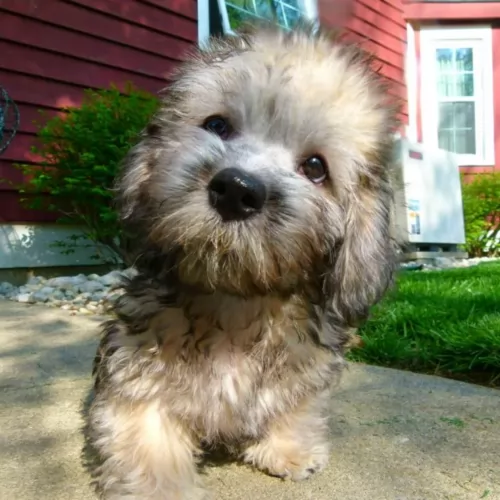 The Dandie Dinmont Terrier is a small dog who stands between 20 – 28cm at the withers and weighs between 8 and 11kg. He is recognizable by his fluffy head of hair.
The Dandie Dinmont Terrier is a small dog who stands between 20 – 28cm at the withers and weighs between 8 and 11kg. He is recognizable by his fluffy head of hair.
He actually has quite a unique look with his long body and slightly over-sized head. He has floppy ears and a long tail. His coat is quite unusual too in that it can be silky and long around the face, legs and belly, while the topcoat is fairly shortish and crisp. His coat color is fawn to brown or reddish. He isn’t a heavy shedder.
Known also as the Dandie, Charlie’s Hope Terrier, the Mustard and Pepper Terrier, the Dandie Dinmont makes an excellent family pet with his calm demeanor, being somewhat reserved around strangers.
He is an alert, intelligent little dog and will warn you of strangers coming into your space. He therefore makes a good watchdog. He is loving and loyal to his human family and will readily fit into life in the city or in the countryside.
They are good with children and pets but with his independent streak, he will require training and socialization if you want him to behave and be obedient.
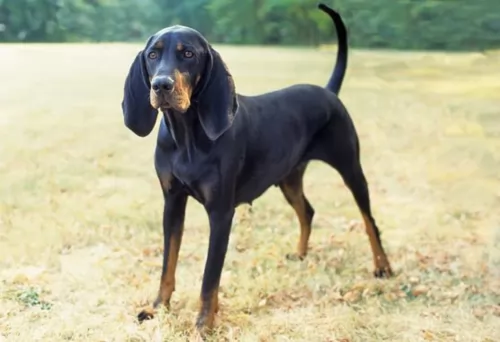 The Black and Tan Coonhound is intelligent, calm, affectionate, independent, strong, and stubborn. They love children and are gentle with them, but they are also very independent and may not do what the child wants them to do in play. They are loyal to their family and will bay at strangers. They are incredibly adaptable and happy-go-lucky. They will end up on the couch or bed so don’t try to fight it. They like cars and enjoy traveling. If you get a BTC be ready for that booming voice.
The Black and Tan Coonhound is intelligent, calm, affectionate, independent, strong, and stubborn. They love children and are gentle with them, but they are also very independent and may not do what the child wants them to do in play. They are loyal to their family and will bay at strangers. They are incredibly adaptable and happy-go-lucky. They will end up on the couch or bed so don’t try to fight it. They like cars and enjoy traveling. If you get a BTC be ready for that booming voice.
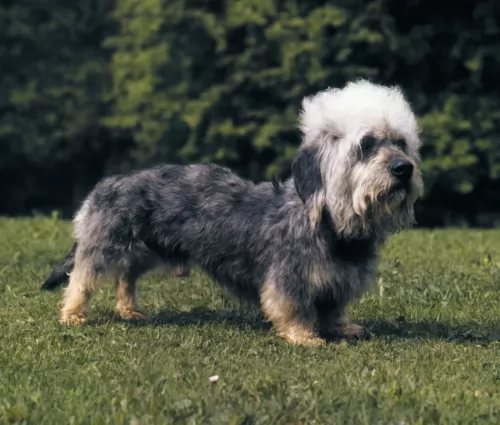 Your Dandie Dinmont is capable of being a wonderful companion. He loves spending time with his human family and is affectionate and loyal.
Your Dandie Dinmont is capable of being a wonderful companion. He loves spending time with his human family and is affectionate and loyal.
The small Dandie is able to fit into life in the city or country, just so long as he has his human family with him. Because he comes from Terrier dogs, he is no push-over though and he has an independent streak which will benefit from training and socialization.
Make sure you give this small dog of yours plenty of love and good care and you will find that you have a loyal, devoted friend in him.
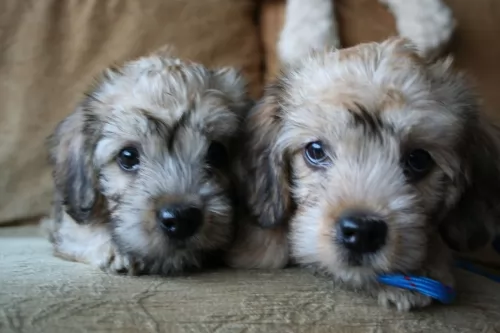 Your pet Dandie Dinmont is a robust little dog who, with good care, can live to be anything between 12 to 15 years of age.
Your pet Dandie Dinmont is a robust little dog who, with good care, can live to be anything between 12 to 15 years of age.
With every dog breed there will be health concerns, and these can include illnesses such as epilepsy as well as hypochondroplasia. All dogs have the potential to fall prey to health problems, and getting your pet from a reputable breeder can help to ensure you eliminate some of these diseases.
This small dog has a long body which means he can be affected by spinal problems. Genetics and body shape play a large role. Intervertebral disc disease is a condition where the cushioning discs between the vertebrae of the spinal column herniate into the spinal cord space. The discs press on the nerves and pain and paralysis can follow.
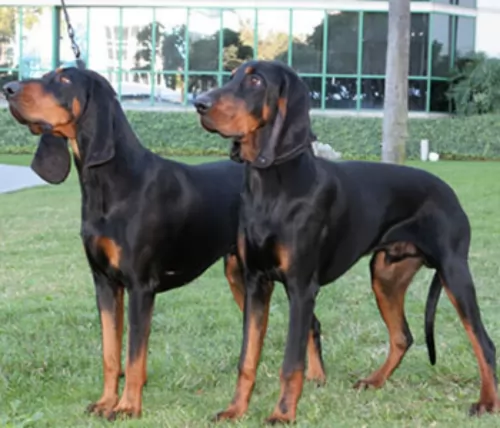 This coonhound is a big, rugged, working dog and needs to be fed accordingly. Feed him at least twice a day in smaller portions and not right before or right after exercise. Don’t send him on a hunt with a full stomach. Don’t overfeed.
This coonhound is a big, rugged, working dog and needs to be fed accordingly. Feed him at least twice a day in smaller portions and not right before or right after exercise. Don’t send him on a hunt with a full stomach. Don’t overfeed.
Not that the Black and Tan Coonhound is lazy, but he can be a couch potato when he is not working. He needs moderate exercise everyday and he does well at activities like barn hunt and field games. If he does catch a scent outdoors and he is not confined in a fence, he will follow the scent with no attention to your calls at all. He can run for miles on end when pursuing prey, but he’d also enjoy just jogging along side you or your bike. He loves long walks but make sure he is on a leash and can’t follow his nose.
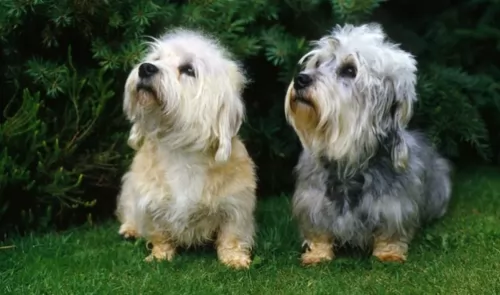 The Dandie doesn’t require as much exercise as some other dog breeds but you want to make sure he goes with you on your walks, or you play ball with him in the garden. You don’t want to see a small dog like this becoming obese as it can herald in a host of health problems.
The Dandie doesn’t require as much exercise as some other dog breeds but you want to make sure he goes with you on your walks, or you play ball with him in the garden. You don’t want to see a small dog like this becoming obese as it can herald in a host of health problems.
The Dandie Dinmont Terrier doesn’t shed a hang of a lot but still, you will need to brush him twice a week to get rid of those loose hairs. Also, the coat will require stripping twice a year. Some dog owners who prefer a low maintenance breed might not like knowing this, but it is a necessary part of his grooming. There are some dog owners who cut the hair rather, but then the texture of the coat will change. This is only important to know if you want to show your Dandie. Other Dandie owners take their pets to a professional groomer for clipping.
Because the Dandie has floppy ears and a lot of hair around the face and ears, you will need to check his ears for dirt and wax build-up as these can cause an ear infection. If you’re nervous to be going inside your dog’s ears, the vet or the dog groomer can show you how.
Also, little dogs like this are prone to tooth decay, and you will need to brush his teeth 2 or 3 times a week. This is because plaque and tartar buildup can cause mouth infections which contribute to other diseases within the body.